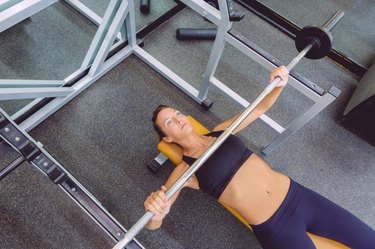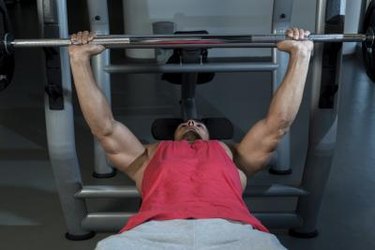
Some sports and exercises are very dependent on the way you're built. It's easier to play basketball if you're tall; you need to be pretty flexible to do gymnastics; and boxers have an easier time hitting their opponents if they have long arms. However, do these differences in body type affect something as simple as a bench press?
Video of the Day
Video of the Day
Whether you have short, long or average arms, there isn't much of a difference in how it affects your bench press. While there may be some slight advantage to those with shorter arms, it isn't enough for scientists to really notice. However, other body characteristics do affect how much you can (or can't) bench press.
Muscle Mass
As it turns out, the biggest predictor of a strong bench press isn't arm length. If you're going to use any body measurement to predict how someone will perform in the bench press, you should use the amount of muscle mass they have in the muscles that do most of the lifting, and how much body mass they have in general.
A team of Brazilian researchers compiled 48 studies in 2003 to try to find the best way to predict maximum strength in weightlifting movements and published their findings in the Brazilian Journal of Sports Medicine. They found that no body measurements are particularly effective to predict strength. However, there is some correlation between muscle size and overall body mass to strength.
The amount of muscle you have is definitely important, but so is the size of your body overall, also known as your body mass. A 2012 study in the Journal of Strength and Conditioning Research also concludes that body mass is more important than arm length. This group of researchers had college-aged males perform the bench press at three different weights.
Each time these subjects performed the bench press they were working with weights below their maximum strength and were told to perform as many repetitions as possible. The researchers concluded that body mass was most closely tied to strength in the bench press. They also say that arm length was moderately related to strength, but not as much as body mass.
Skill Level
A fairly reliable way to predict how someone will perform in the bench press is simply the amount of years that they've been doing it. A study published in the Journal of Strength and Conditioning Research in 2003 attempted to figure out how to predict bench press strength in high school powerlifters.
The researchers concluded that the number of years of experience that the student had with bench pressing was correlated with their bench press strength. They also noted that no single body measurement, including arm length, could predict how strong they were. This shows that experience is probably more important than arm length when it comes to bench press strength.

Other Exercises
Finally, if limb lengths don't matter very much in the bench press, do they matter in other weightlifting activities? In a 2006 research article in the Journal of Strength and Conditioning Research, a group of scientists looked at just that. They tested junior elite American weightlifters to see what physical characteristics made them stand out from their competition.
They arrived at five things that separated these athletes: body mass index, vertical jump height, body fat percentage, grip strength and how vertical their torso was during an overhead squat. Note that neither arm nor leg length were included in these weightlifter's defining factors. However, body mass index was mentioned as the most important variable, just like it was in the bench press.
- Relationships of structural dimensions to bench press strength in college males.
- Anthropometry as a predictor of bench press performance done at different loads.
- Anthropometric Dimensions to Predict 1-RM Bench Press in Untrained Females
- ANTHROPOMETRIC AND PERFORMANCE VARIABLES DISCRIMINATING ELITE AMERICAN JUNIOR MEN WEIGHTLIFTERS.
- Prediction of 1 Repetition Maximum in High-School Power Lifters.
- Muscular strength and endurance tests: reliability and prediction of one repetition maximum – Review and new evidences